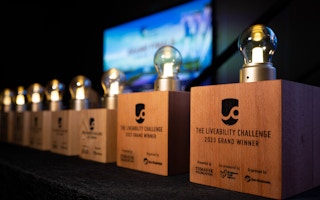Solutions to improve the health of farmed fish and reduce carbon emissions from natural gas power facilities have won the sixth edition of the The Liveability Challenge (TLC), a global search for sustainability solutions to solve the world’s toughest problems.
To continue reading, subscribe to Eco‑Business.
There's something for everyone. We offer a range of subscription plans.
- Access our stories and receive our Insights Weekly newsletter with the free EB Member plan.
- Unlock unlimited access to our content and archive with EB Circle.
- Publish your content with EB Premium.
Singapore-based fish disease prevention start-up TeOra, and Susteon, a United States-based carbon capture firm, claimed the top prizes of S$2.5 million (US$1.87 million) in funding.
TeOra’s orally-delivered solution prevents and treats scale drop disease virus in Barramundi, or Asian sea bass, Singapore’s most heavily farmed fish.
Susteon captures carbon dioxide from natural gas plants and converts it into “green methane”. Susteon’s founders estimate that their solution could help to reduce gas-dependent Singapore’s emissions by 20 per cent.
Both start-ups emerged winners from a shortlist of eight finalists selected from more than over 600 submissions – a record this year – from 82 countries.
Other competition winners include Seaforestation.co, a Philippine start-up that scales seaweed forest regeneration to remove atmospheric carbon and provide deepwater irrigation. Seaforestation.co, TeOra and Susteon were awarded S$100,000 (US$75,000) in funding from impact investment firm PlanetRise, family office Rumah Group and venture capital funds Quest Ventures and TRIREC.
TeOra was also most popular food and nutrition solution in a poll voted on by the TLC audience at the ceremony at Marina Bay Sands in Singapore.
Seaforestation.co was the most audience’s favourite solution in the decarbonisation category.
The competition, presented by Temasek Foundation and organised by Eco-Business, focused on two key themes this year – climate change and food and nutrition, with the climate track split between ocean conservation and restoration and decarbonisation. It features ocean ecosystem solutions as a focus area for the first time.
The other finalists include British contender Seabound, which captures carbon from ships, Carbix Corporation, which absorbs emissions from industry and converts the carbon into construction materials, and Nika.eco, an analysis tool for mangrove restoration.
Finalists in the food and nutrition track included Singapore-based animal-free eggs manufacturer Proteomax, and Plantae Bioscience, which cultivates gene-edited tomatoes for vertical farms.
The winners were selected by a live panel of judges, who assessed the candidates based on the power of their ideas as well as their ability to pitch those ideas to investors. The judging panel included Chan Hian Lim, deputy chief executive officer, Singapore Food Agency, Lim Hock Chuan, head, programmes, Temasek Foundation and Kathlyn Tan, director, Rumah Group.
Last year’s edition of The Liveability Challenge was won by social forestry project in Indonesia. Other winners since the launch of the competition in 2018 have included lab-grown milk, carbon capture from the ocean and biodegradable bioplastic.












